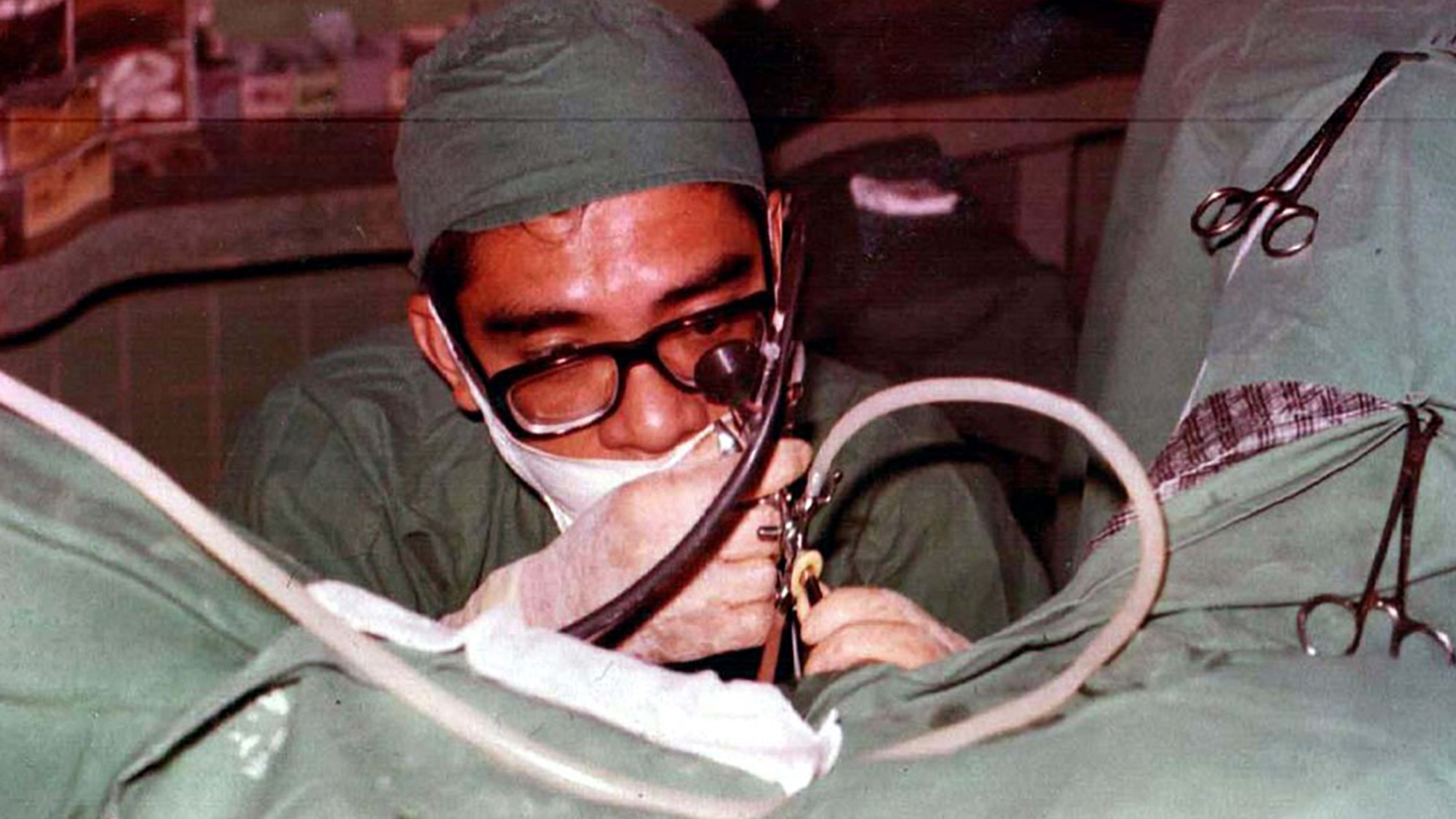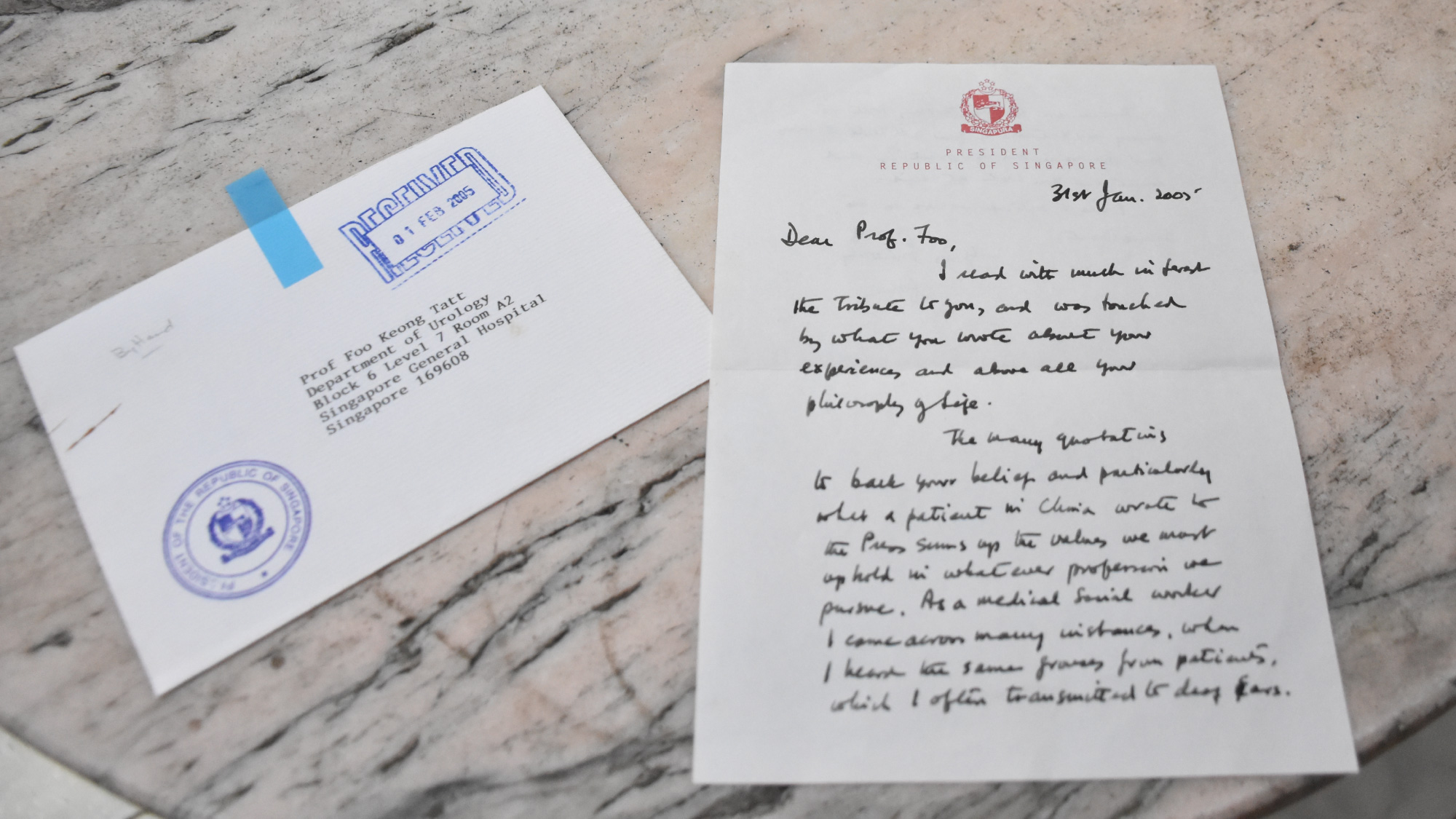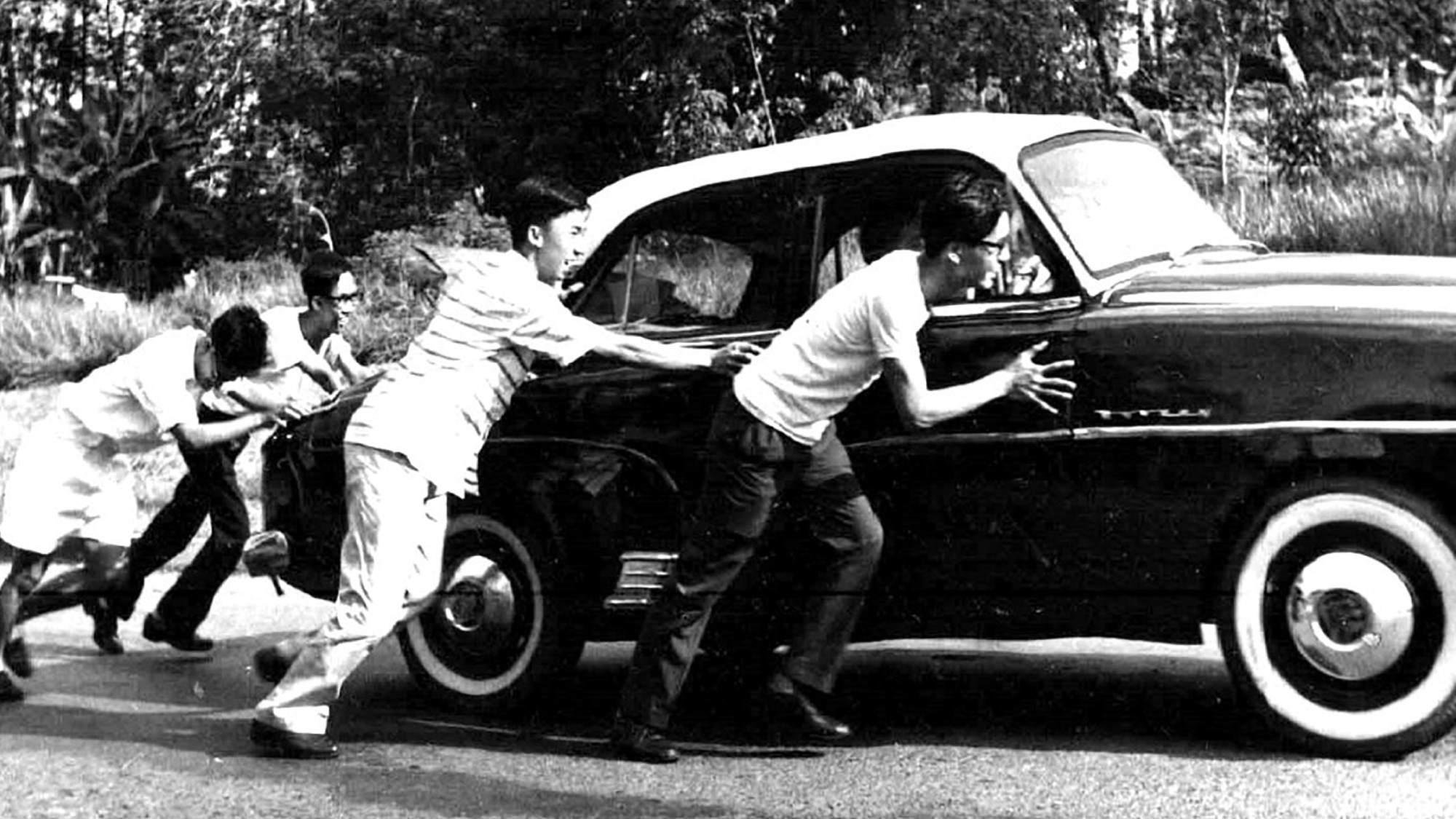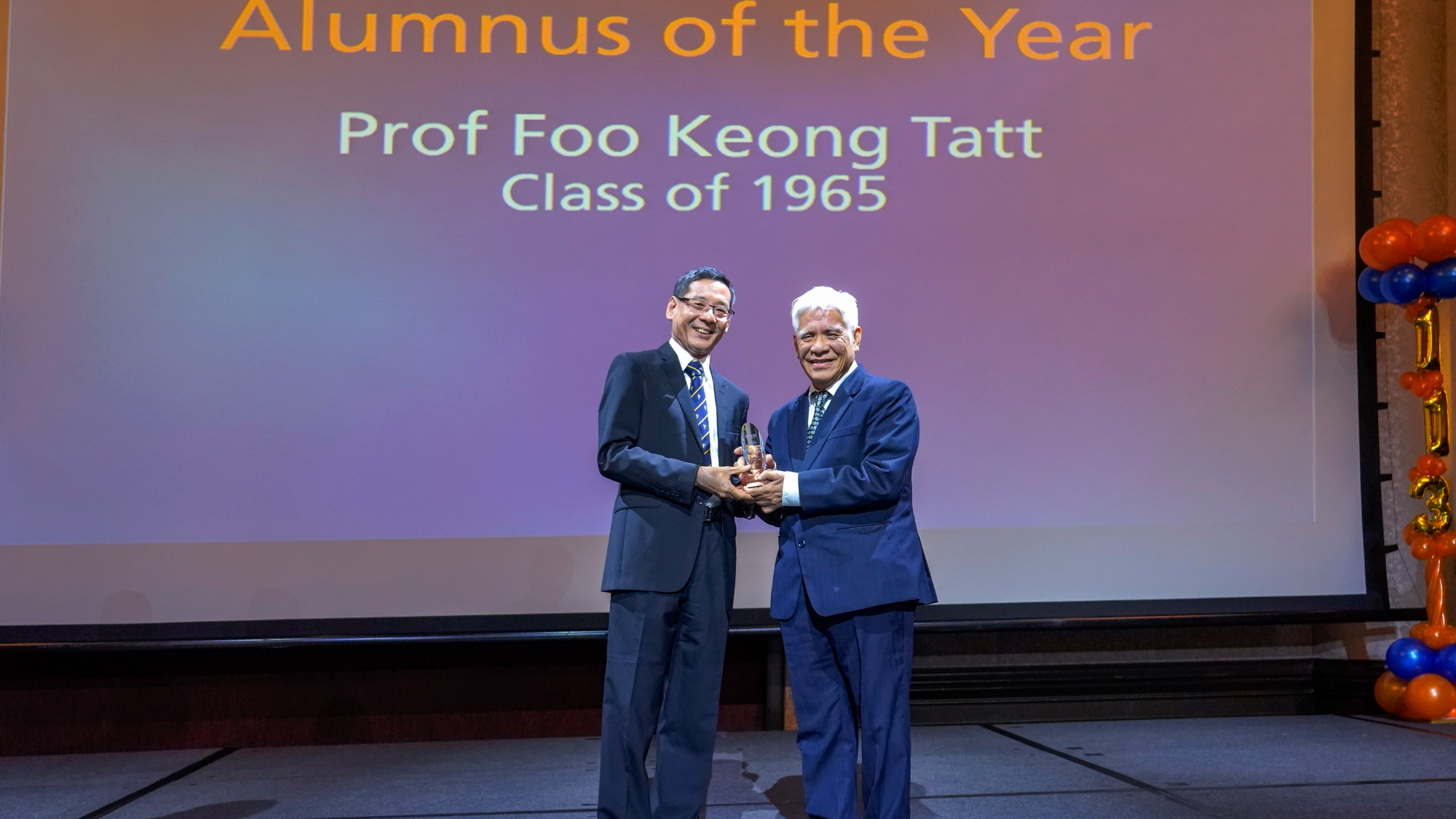Every Man’s Best Friend
Professor Foo Keong Tatt, Emeritus Senior Consultant at the Singapore General Hospital (SGH), championed the practice of Urology in Singapore, pioneering the transurethral resection of the prostate (TURP) procedure here. The trailblazer has taught and inspired generations of clinicians and students and was recognised as ‘Alumnus of the year’ at the inaugural Alumni Awards organised by NUS Medicine in 2018. The alumnus from the Class of 1965 shares insights from his life’s work.
Scouting his way to medicine Born and bred in Penang in the 1940s, Professor Foo grew up with eight siblings and attended the village Chinese primary school. He then transferred to an English school in the district capital. He was good at mathematics and planned to take up engineering as a career. But thanks to the Boy Scouts movement, his ambition gradually changed. When the National University of Singapore was officially formed in 1962, we were there to raise the flag at the ceremony at Bukit Timah Campus,” he recalled.
Prof Foo fondly recalls his medical student days, such as when he tried in vain to take blood from a patient because he could not locate the veins. His tutor patiently coaxed him through the procedure, instead of taking over the task. It is something that he remembers with gratitude because it allowed him to learn from initial failure and to persist. He laughs about how his clinical group also had to take turns to ventilate patients during night duties (‘pumping duty’) as there was no respirator in those days.
Then there was also the occasional drama. “There was a fire at the library in College of Medicine building next to our hall one day, and the fire damaged the library and the Allen and Farris lecture theatres. We had to quickly help and move out the library books.”
There was also plenty of fun. Once, Prof Foo and his friends took a road trip to Kuala Lumpur to attend a scholarship interview. The car ran out of petrol midway, and they had to push the car to the next petrol station along the Malaysian motorway.

Prof Foo at work.

A chance meeting, romance and NUS’ gain
After graduation, he returned to Malaysia for his housemanship and served National Service in Kota Bahru as a Medical Officer. He was posted to Surgery to replace the then medical officer who was allergic to gloves and unable to do surgery.
Surgical training at the University Hospital in Kuala Lumpur came next: the hospital had just been established and was under the directorship of Professor T.J. Danaraj, former Dean of Medicine.
“That’s where I met my wife. She was a trainee in the O&G department. We were bringing patients for clinical rounds and we lost our way for a meeting in the hospital. We chatted and got to know one another.”
After completing his training in 1970, Prof Foo went to the UK for his postgraduate (FRCS) and residency, while his wife went to Edinburgh. They got married in Scotland.
The question about where they were going to live and work was settled after an offer arrived from Singapore. “The University of Singapore answered me first, so we came here in 1972 and joined the University as a lecturer.”
Prof Foo began specialising in Urology in 1976 when he was offered the Smith and Nephew’s Fellowship and spent his sabbatical in London and Cambridge for a year. Transurethral resection of the prostate (TURP) had just been introduced as a new procedure internationally, and the head of the NUH Department of Surgery then, Professor Ong Siew Chey, encouraged him to learn transurethral work as there was a need for it at that time.
Prof Foo returned to Singapore to establish transurethral surgery as the procedure of choice for treating obstructing prostates. The transurethral surgical procedures eventually distinguished the specialty of Urology from General Surgery and helped to further Urology as a specialty in Singapore.
The urology pioneer
In the 1980s, the Singapore General Hospital wanted to form a department specialising in Urology. Prof Foo and two other colleagues, Dr Tan Eng Choon and Dr Tung Kean Hin, spent their weekends collecting urological cases, doing clinical research and writing papers and got them published. All the hard work had been done without funding, he noted. What they had was their determination to build Urology as a specialty.
In 1988, the first Urology department in Singapore was finally formed at SGH with Prof Foo as the inaugural head of department. Its staff comprised two consultants and two registrars. The department celebrated its thirtieth anniversary in 2018 with 12 consultants, six registrars and trainees.
Prof Foo also founded the Singapore Urological Association in 1986. Fast forward three decades and the Association today has more than 90 members along with a structured training programme and examinations conducted by the Joint Committee for Specialists Training (JCST).
Lauding him as the Father of Singapore Urology in 2007, the Singapore Medical Association noted Prof Foo’s significant contributions to the development of the specialty here, his dedication to the training of generations of urologists who continue his good work and are now serving actively in various hospitals. It also noted the founding of the Singapore Urological Association, with him as its first President in 1986, his service as the Secretary General of the Urological Association of Asia for the last eight years, and also as Honorary Executive Director of the Association. In both capacities, he helped to put Singapore on the map of urology in Asia and the world.

Prof Foo and his classmates had to push their vehicle which ran out of petrol along the Malaysian motorway. Prof Foo is at the rear, with Dr Liew Kuen Hoe, the late Prof Chan Heng Leong and Dr Chan Khai Poh.

Prof Foo was recognised as ‘Alumnus of the year’ at the inaugural Alumni Awards organised by NUS Medicine in 2018.
The art of balance
One of the reasons that Prof Foo remained in institutional practice was to fulfil his passion for teaching. “Developing young minds is very important. I think now the main difference is to teach the younger generation not to over-treat. They tend to pay too much attention to science, but actually practising medicine is balancing the science as well as the art; the art of medicine may be more important. Whatever you do, there is always a risk. If you do too much, the patient may be worse off… it’s very important for us to treat the patients individually, to consider various aspects and treat them as a whole.
He rattles off six Chinese characters that he learnt from Professor Wu Jieping, a pioneer of Urology in China:
“一切为了病人,为了病人一切, 为了一切病人”
Translation: “Everything we do should be in the interest of the patient, and we should look after the patient as a whole. Treating all patients, irrespective of class or creed.”
“The important thing is to individualise the treatment of patients. The younger generations might know about the latest controlled trials and technologies, but to apply them to real life situations require experience. That is why it is important to keep experienced doctors to be around to supervise them.”
One good example of treating patients as a whole, is in the management of Benign Prostate Hyperplasia (BPH), a common problem worldwide. Prof Foo helped to define
the clinical disease as an adenoma, and classified according to the grade of the disease, evidenced by the degree of the growth’s intrusion into the bladder (intravesical protrusion of prostate or IPP) and seen on clinical ultrasound. This has helped to treat this common disease more cost effectively. IPP was cited by Prof Claus G Roehrborn in the American Urological Association (AUA) lecture, at the European Urological Association (EAU) meeting in London in 2017, attended by more than 10,000 participants. It is a moment that Prof Foo remembers with pride.
A man for all seasons
Prof Foo still works a five-day week and juggles teaching and clinical work and research.
He keeps cards, letters and thank you notes from students, patients and colleagues, including a handwritten letter from then-President Mr SR Nathan. He also has his diary, logs and copies of his letters to his family in Penang from his college days. His brother is also an alumnus from the Class of 1969.
Outside of work, the 77-year-old treasures his personal time with his wife and their 27-year-old son, a musician, and daughter-in-law.
He keeps in touch with his extended family and relatives in China, Malaysia and Singapore, plays the Chinese flute, paints, practises calligraphy and does water colour paintings, swims, taiji and meditates.
Being mindful and relaxed boosts the immune system, and is key to preventing illnesses and maintaining good health, he says. It’s good, sound, fluid advice, one might say.
